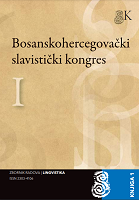Emotivno vrjednovanje iskaza pomoću komunikacijskih priloga u hrvatskom i poljskom jeziku
Emotive valuation of utterances by communicative adverbs in Croatian and Polish
Author(s): Neda PintarićSubject(s): Semiotics / Semiology, Western Slavic Languages, South Slavic Languages, Pragmatism
Published by: Slavistički komitet BiH
Keywords: Pragmalinguistics; communicative adverb pragmemes; pragmaphrasemes; emotive utterances; communicative adverbs;
Summary/Abstract: Communicative adverbs are pragmatic units called pragmemes. Those are emotive marked words utter by speaker to the listener. Marking is the most important characteristic of human relations. In early childhood a child shows its pleasure when smiling or crying. Parents approve or rebuke them for their deeds. During our schooling we are marking for getting knowledge. Comparison of adjective and adverb consist only of three degrees, but interlocutors use a lot of emotion grades in communication choosing various adverbs, sinthagmes or phrases during their turns. We analised three types of communication adverbs and their grades: admirable type (e.g. not bad, very good, exellent, perfect, wonderful, super, cool etc.), blameworthy type (e.g. bad, very bad, horrible, blamable, dreadful, awful etc.) and ambivalent type (with adverbs which can be used as positive or as negative ones) . As we can see, there are a lot of communicative adverbs (lexemes, synthagmes or phrasemes) due to which our utterances are emotivly enriched.
Journal: Bosanskohercegovački slavistički kongres
- Issue Year: I/2012
- Issue No: 1
- Page Range: 597-606
- Page Count: 10
- Language: Croatian

